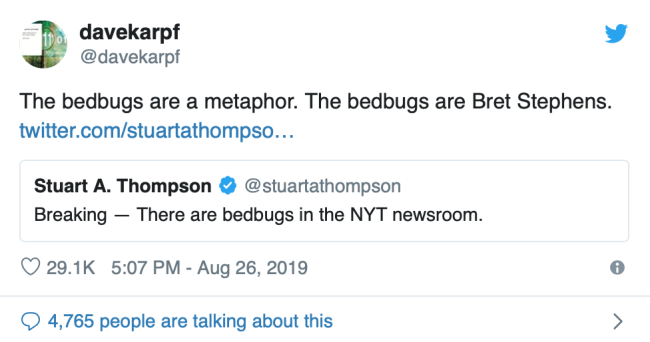You have /5 articles left.
Sign up for a free account or log in.

It was the bedbug joke heard around the world (just not at first). And you’ve probably heard it by now. So let’s start at the end of the story instead of the beginning: George Washington University's provost on Tuesday defended a professor to New York Times columnist Bret Stephens -- and then invited Stephens to campus to talk civility. Stephens, who often writes about the virtues of free speech, previously complained that the professor had compared him to a bedbug on Twitter.
Some of those following the feud said that Provost Forrest Maltzman’s invitation sent the wrong message: tattling on someone for exercising their First Amendment rights gets you a speaking opportunity at a fancy campus.
But the professor at the center of it all, political communication scholar David Karpf, said in an interview that he actually hopes Stephens will take up Maltzman’s offer.
“I would be thrilled if he wanted to come and have a public conversation with me about this episode -- I’m the associate director of the School of Media and Public Affairs, so we could make that happen,” Karpf said. “If he’d like to have a conversation about civility and digital media in this age, that’s right up our alley.”
More on Mr. Bedbug
In his Confessions of a Community
College Dean post, Matt Reed applauds
GW's provost for his stance.
Karpf guessed that it probably won’t happen. He also expressed surprise that Stephens had doubled down on his hurt over being likened to a bedbug during an interview on MSNBC. In any case, Karpf said, “I feel very supported.”
Asked why he thought Stephens singled him out, Karpf said that Stephens was trying to assert his position in the social hierarchy -- and in so doing abusing his power as a Times employee. He also said that being a white, male, tenured professor allowed him to take Stephens's actions in stride, and that he doesn't take that for granted. Others have made similar remarks.
The Times did not immediately respond to a request for comment.
Pulling Back the Covers
On Monday, upon hearing that the Times’s building had a bedbug infestation, Karpf tweeted that the problem was actually Stephens. He was only half joking: Karpf, like many Times readers, dislikes Stephens for his skeptical takes on climate change and other issues.
The tweet didn’t get more than a handful of likes, and Karpf didn’t tag Stephens in it. But Stephens somehow saw it and took offense. He emailed Karpf, CC’ing Maltzman, to say that he’d set a “new standard” for Twitter insults. Stephens invited Karpf to “meet my wife and kids, talk to us for a few minutes, and then call me a ‘bedbug’ to my face. That would take some genuine courage and intellectual integrity on your part.”
Karpf shared news of the incident on Twitter without naming names -- at first. But eventually he gave in to demands that he share the email in question. And the Streisand effect was in full, well, effect. Karpf’s Twitter feed gained about 13,000 followers overnight. Bedbugs trended on search engines and social media (with a little boost from President Trump, who, incidentally, was denying that his Doral resort had had bedbugs).
Why the interest? Lots of reasons: the spectacle of an adult public figure being so hurt over being called a bedbug -- and not realizing how his actions would backfire (even Merriam Webster threw shade). Stephens’s assertion that Karpf’s milquetoast tweet was a new low for social media, where women and sexual and ethnic minorities are slurred and threatened every day. The boldness of CC’ing Karpf’s provost. Arguable hypocrisy, given Stephens’s denunciation of safe spaces and calls for civil debate. And other issues at the Times -- including a recent, similar episode involving Jonathan Weisman and the writer Roxane Gay.
In his interview on MSNBC, Stephens denied that he was trying to get Karpf in trouble when he CC’d Maltzman on the email to Karpf. Instead, he said, "It is the case that at The New York Times and other institutions, people should be aware, managers should be aware, of how their people -- their professors, their journalists -- interact with the rest of the world." Yet Karpf said that Stephens also contacted another administrator about him, separately.
Stephens said there’s a historical pattern of “totalitarian regimes" likening people to insects. Some of his supporters have since called Karpf’s comment anti-Semitic.
Stephens is Jewish. So is Karpf, who denied that there was any racist messaging -- or anything else too deep -- in his tweet. Most of the time, he said, his Twitter feed is full of "dad jokes." Stephens announced that he's quitting Twitter, calling it a "sewer."





